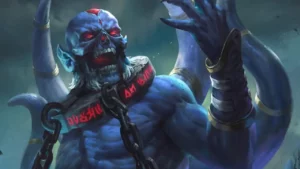Remember Artifact?
Remember how promising that game was supposed to be?

Well, looking back, it sure was a hot mess.
Don’t get me wrong, I enjoyed the game very much. It was nice and fresh, and the complexity allowed for such incredible games, but whew, were there so many problems. Here are 10 of many.
10. Marketing
What exactly was Artifact trying to sell? Was it supposed to be the card game for hardcore card game players, or the card game that lapsed and jaded TCG enjoyers would love?
9. Presentation
The game, as a whole, looked very dark and gloomy. The UI of the game was dingy, and the pacing of the gameplay was fluid, but in a “chugging milk” sort of way, as opposed to a “sipping wine” way. It wasn’t horrible by any means, but it was very thick and abrasive, almost as if it’s pulling your arm and making you play when you boot up.
8. Three Game States
This idea was very ambitious, and wasn’t even necessarily bad. I think this design choice was simply in the wrong game, mostly due to how the complexity was too fixated on the forced rotation style of play. If things were more freeform, I could see this making the game way more fluid.
7. Promotion
The promotion started out very well, having alphas and open and closed betas, some of which I was lucky enough to be a part of. That all fell apart when the game started getting more exposure. It catered to well known card game players and them alone, which had a very severe trickle down effect of never being fully grasped by the common card player.
6. Economy
The cards were, put plainly, way too difficult to get without spending a ton of money. The Steam marketplace was not enough. In fact, it created an even greater discrepancy between the good cards and everything else.
5. Mechanics
There were way too many mechanics. I couldn’t even begin to tell you all of them because it would wind up a piece of its own. It tried to mirror a lot of what made games like MTG good, but overall, the mechanics fell short because they wound up getting in the way of each other, creating a very clunky and hamfisted mess that you had to figure out, elegance be damned.
4. Limited
Speaking of mechanics, the overall clunkiness of mechanics is what made drafting, and limited in general, feel so good to draft, but so bad to play. There were countless times where I drafted something that seemed cohesive, like green aggro or blue/red big bodies, felt pretty good about synergies and filler picks, only to wrack my head trying to actually figure out how to put it all together because of this weird interaction that I wouldn’t have known existed prior to it happening.
3. Approachability
Which leads me to this point: the game was very hard to get into. It often felt like I had to have a Ph.D. in astrophysics to enjoy the game. There was no way to just jam with a chill constructed deck. There was no good way of teaching new players in an efficient manner. You kind of had to just play forever to even get into it. Complexity is good, don’t get me wrong, but complexity for the sake of complexity is annoying. It almost felt like the game, as a whole, was made so that people who could figure things out would feel “smart”. That’s not a game many players wanted to be a part of.
2. Flexibility
Because of those complexities, the game often felt like you kind of had to stick with what made sense. Venturing outward, even if it was by a single card choice, was so catastrophically bad to do that you would quite literally lose tournaments because of it and not even know it. The metagame being rigid was one thing, but the metagame being rigid, and grossly overtuned was what made the problems arise so quickly.
1. Replayability
Lastly, there was little reason to keep playing the game. Communication went down significantly. Murmurs of a new set dwindled. The card pool was too small to sustain itself if there was no new set, and players kind of grew tired of how poor everything wound up being. Why put so much time and so many resources into a new game where the tried and true was already there?
Artifact was certainly a game for the ages, but for reasons I don’t think any of us would have expected at the time. I never want to see a game fail, but this game will go down in history as the game that probably shouldn’t have been.
Anthony Lowry (they/he) is a seasoned TCG, MMORPG, and FPS veteran. They are extensively knowledgeable on the intricacies of many competitive outlets, and are always looking for a new challenge in the gaming sphere.

